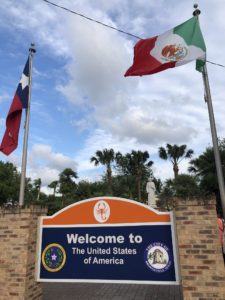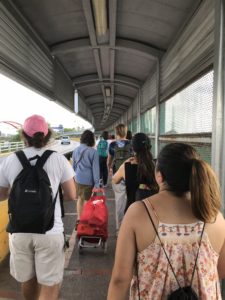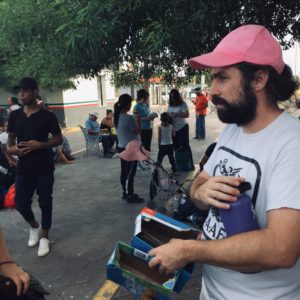Reflections from the Border: Experiencing the Effects of Recent Immigration Policies in July 2019

In early spring of this year, there were vague whispers of border policies shifting once again. By the time our Girasol team went south in July, the border experience that they had previously witnessed had changed dramatically.
This was the third border trip that Girasol has taken within the year. Scheduled every season, these dedicated social workers and students get the chance to assist in firsthand support for immigrants who have just been released from detention. This summer, 13 students and social workers traveled to three border towns in three days: McAllen, Brownsville, and Harlingen.
As we gear up for our fourth and final border trip of the year (which will be in early December), here are some reflections from several of our border trip members from July, and the changes they saw from the first two border trips to now.
Special thanks to Central Texas MoveOn for their July border trip donations, courtesy of our Girasol Amazon Wishlist.
|
What one word or phrase sums up your experience? Monica: Exhausting Nataly: Encouraging Jim: Overwhelming Ana: Complex |
In what ways did you see the practical impacts of recent immigration policies we’ve been reading about in action during the border trip?

Monica: It was amazing to see “the list” and the people waiting on the other side of the border. It was also interesting to see so many migrants from Venezuela this time.
Nataly: We saw variety in the composition of families, but never the full family with both parents. Some of the people we spoke to at the bus station had a family member in detention or had been separated from their children. Both expressed fear of never seeing their family members again.
It seems that McAllen has collaborated with Catholic Charities, so in that city there is an informal system of getting people to community-based services. But this means the community is having to pick up the slack and do the hard work.
Because of the backlog in immigration proceedings and lack of resources from the government to adequately manage this situation, most of the migrants did not have a date for their immigration hearing. If I understand correctly, when their names are called to be let into the US, they are then placed in detention. Imprisoned. That is how immigrants spend their first few days in the US.
“With each mat I cleaned, I imagined who might be sleeping there, and wished them a good night’s rest and good health in their journey ahead.”
Jim: After all the recent headlines and news coverage concerning overcrowding in detention centers and their poor sanitary conditions, it was impactful to witness the restorative dignity families received at the Catholic Charities Respite Center through something as simple as a clean shower, a change of clothes, and a place to sleep. It was also difficult to witness so many sick children, to imagine the stress and trauma they have endured through their journey and recent detention, what illnesses might be spreading through the current lack of sanitary conditions in those detention centers, and the potential long-term impacts of childhood illness spread through these poor sanitary conditions. My job as volunteer was to clean the respite center’s sleeping mats with a solution of soap, water, and bleach. I found myself reflecting on the power and importance of cleanliness and dignity. With each mat I cleaned, I imagined who might be sleeping there, and wished them a good night’s rest and good health in their journey ahead.
Ana: There was a big difference in what we saw on the physical border and at the migrant shelter compared to the past two trips. The “Remain in Mexico” policy was clearly impacting the numbers of folks making it across the border, as we saw about a third of the number of families at the shelter. While this made the environment less hectic, we also heard about the shelter talking through getting supplies to similar programs in Mexico who were now taking in more people. Hearing about threats against migrants waiting in Mexico definitely made me concerned for their safety and caused me to contemplate the gravity of policies that we hear about on the news.
What did you find most useful to support your self-care during the trip and what supports did you seek after coming back from the trip?

Jim: The experiences were at times overwhelming and taxing both physically and emotionally on my body and mind. As a non-native Spanish speaker, I found my language faculty at times diminished under the stress of the trip. Maintaining my own self-care, and turning to my peers for support where I needed it, allowed me to re-access my Spanish-language abilities and connect with families at the respite center and bus station. These connections, both with my peers and with immigrant families, continued to help strengthen my personal sense of self, confidence, and well-being.
Ana: I found myself tracking my energy levels and need to take breaks, particularly while cleaning the enormous pile of mats. I also appreciated processing the experience with others on the trip to feel supported and connected. I also took time each evening to re-center and re-ground myself through some of my bed-time rituals that help me to release stress. I think it can be hard to engage in these when we spend all day seeing the circumstances of folks waiting at or recently having crossed the border. I find it important to invite self-compassion and know that it takes energy to do this work, so it is always important to re-charge.
If you have been on a previous border trip, what stood out to you as different this time around?
Monica: The cries of the younger children stay with me. As a mom, I can tell a hungry or tired cry. But these were cries of emotional pain that I had not heard.
When these children are in the hielera (holding cells) with their parents, even if they are not separated, attachments are disrupted. Children look to adults for protection. When their parents cannot feed them when they are hungry or help when they are sick, the parent/child relationship changes. Ironically, that parent who traveled thousands of miles to save her child’s life, now has a child who is angry with her when it is the fault of every American that we lack a true humanitarian response to a humanitarian crisis.
“As social workers, it involves never-ending work of self-reflection, self-awareness, and learning/implementing what helps us feel regulated.”
Ana: I found that this time, volunteers were more triggered and affected by the situations of children everywhere we volunteered. This made me consider all of the ways we can work to stay regulated and grounded individually and as a group. It is always hard to witness suffering, particularly when we feel as if we have little control over both the larger system and the individual we are supporting. As social workers, it involves never-ending work of self-reflection, self-awareness, and learning/implementing what helps us feel regulated. I was so inspired by how our volunteers continued to bring caring, compassion, and energy throughout the weekend as they worked to navigate those challenges.
To stay up to date with Girasol, check out their website.
